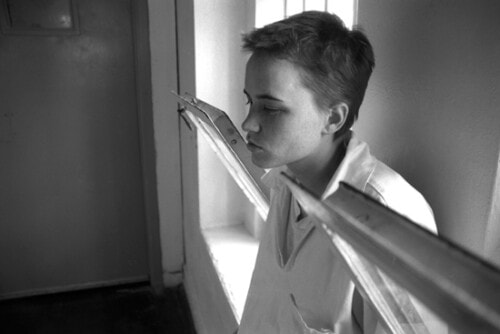Obama’s Responsible Fatherhood Campaign
There are less obvious but equally important places where the Obama administration could be pressed to stand up for gender justice, the inclusion of LGBT people, and the rejection of the religious right and its conservative “family values” agenda. As a black leader in U.S. society, President Obama is vulnerable to criticism that he is too “soft” on the African-American community where it appears they only have themselves to blame for their unequal standing. In particular, the idea that poverty is caused by black women and their sexual recklessness and inferior parenting is particularly virulent in the United States. 1 Every black politician must negotiate a treacherous path; even the most controversial white contender will never be exposed to the same type and degree of scrutiny and moralistic criticism. Will the black candidate cater to the special interests of his or her own people, and thereby put the general population at risk? Will he or she fail to ensure that black criminals receive the rough justice of retribution? Will he or she fail to punish the welfare queen for her sins? Will he or she make sure that the governmental rewards that do flow to the black community are channeled exclusively to the hard-working blacks from the middle class who are maintaining impeccable moral standards by getting married and staying married?
The African-American politician’s burden is made all the more difficult with the sensationalistic corporate media standing ready to pounce on virtually any scandal. Illegal drug use and sexual immorality have become branded, thanks to America’s racial legacy, as stereotypical black behavior. The two failing wars abroad and the collapsing economy at home only intensifies the apocalyptic thirst for more scandal. A social justice-oriented media would begin with a principled assessment of the real reasons for poverty in general and the poverty of the black families headed by single mothers in particular; this would include our substandard public education system, low wages, the business lobby’s successful disempowerment of the labor movement, gender and racial discrimination, and inadequate child care—and it would explore the possibilities for building creative political alliances. Instead, neoliberalism wins out again and again, as scandal coverage swallows up almost every bit of mainstream news coverage, and criticism of economic inequality, militarism, and social exclusion are pushed to the margins of public discourse.
It is therefore understandable that an ambitious black politician might want to situate himself or herself favorably within the American political terrain by seizing upon a moral issue and making it his or her own. President Obama, for his part, has made responsible fatherhood a signature plank of his political agenda. From the perspective of feminists and LGBT activists, this choice will, at best, yield ambiguous outcomes. At worst, it could become a vehicle for the pursuit of policy objectives that ultimately contradict social justice principles.
On the campaign trail in 2008, President Obama returned several times to the theme of “responsible fatherhood” as an integral dimension of sound anti-poverty policies. In his Father’s Day speech, which he delivered at Apostolic Church of God, Obama praised black men who act as strong father figures. He continued:
If we are honest with ourselves, we’ll admit that what too many fathers also are is missing—missing from too many lives and too many homes. They have abandoned their responsibilities, acting like boys instead of men. . . . We know that more than half of all black children live in single-parent households, a number that has doubled—doubled—since we were children. We know the statistics—that children who grow up without a father are five times more likely to live in poverty and commit crime; nine times more likely to drop out of schools and twenty times more likely to end up in prison. They are more likely to have behavioral problems, or run away from home, or become teenage parents themselves. And the foundations of our community are weaker because of it. 2
Feminist social scientists, such as Judith Stacey, have long debunked the right-wing idea that single parenting causes social pathologies; given half a chance, single mothers can do just fine raising children. 3) There is a consensus among social scientists that “child outcomes are affected by a large number of factors other than the number and types of parents present in a child’s household. These factors include, inter alia, the overall quality of parenting as reflected in parental love, warmth, involvement, and consistency; pre- and post-natal care; adequate nutrition and health care; whether the child was planned or wanted; the mother’s age at conception; parental socioeconomic resources; quality of neighborhood and schools; influences of peers and siblings; and the child’s own abilities, temperament, attitudes, and psychological resources. Moreover, research reflects wide variation in child outcomes even for siblings residing in the same family.” 4 While single mother-headed families have a higher rate of poverty than the ones headed by a single father or by a married couple, this difference reflects the extreme wage inequality endured by working mothers, rather than problems intrinsic to the single-mother family form. The poverty rate for the families headed by single mothers (for every racial and ethnic group) is double that for families headed by single fathers. 5 One study found that as many as 49% of all low-income children live with married parents. 6 Other research suggests that the vectors of causality move in many directions at once. On the one hand, divorce or separation can lead a non-poor family to fall below the poverty line; on the other, economic instability can contribute to family disruptions. 7
Obama’s child welfare outcomes-based argument against single parenting therefore lacks support in the social science literature. The call for responsible fatherhood is also problematic insofar as it has, embedded within it, a mandate for governmental marriage promotion. Drawing once again from the racial slurs against the welfare queen, the right has attempted to persuade voters and policymakers that poverty is caused by poor single mothers who are irrationally avoiding marriage. If these women would just march down the aisle, the argument goes, we would have less poverty and could reduce our poverty programs.
- Patricia Hill Collins, Black Feminist Thought (New York: Routledge, 2000); Ange-marie Hancock, The Politics of Disgust: The Public Identity of the Welfare Queen (New York: New York University, 2004).[↑]
- Sen. Barack Obama, “Remarks: Apostolic Church of God,” Chicago, Ill., 15 June 2008.[↑]
- Judith Stacey, In the Name of the Family (Boston: Beacon Press, 1996[↑]
- Frank Furstenberg et. al., Brief for Andrew E. Cherlin et. al. as amici curiae supporting appellees, Baehr v. Miike (Hawaii Cir. Ct., Dec. 3, 1996).[↑]
- New Strategist Publications, American Incomes (Ithaca: New Strategist Publications, 2001), 343-7.[↑]
- National Center for Children in Poverty, Ayana Douglas-Hall et. al., Basic Facts About Low-Income Children: Birth to Age 18 (Washington, D.C., September 2006).[↑]
- Sara McLanahan, “Parent Absence or Poverty: Which Matters More?,” in Consequences of Growing Up Poor, ed. G. Duncan and J. Brooks-Gun (New York: Russell Sage Foundation, 1997), 38-45.[↑]



